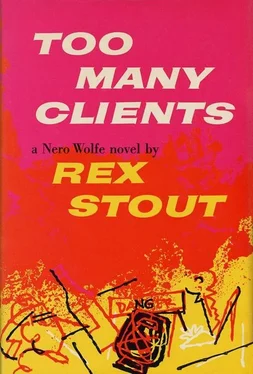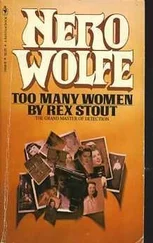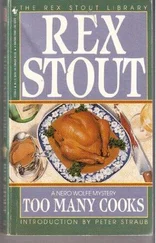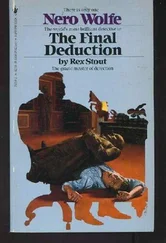“Not conveniently, no. Can’t it wait until after lunch?”
“It shouldn’t. Sometimes convenience must bow to necessity. Delay would be hazardous.”
“Damn it, I...” Pause. “You say with Miss McGee?”
“Yes. Her presence is required.”
“I don’t know.” Pause. “All right. We’ll be there.”
Wolfe hung up. He cleared his throat. “Your notebook, Archie. Not a letter, a draft of a document. Not for mailing.”
On the wall of the office, at the right as you enter, is a picture of a waterfall, not large, 14 by 17. Its center is one inch below my eye level, but I’m just under six feet tall. The picture was made to order. On the wall of the alcove at the end of the hall is a hinged wood panel. Swing it open, and there’s the back of the picture, but your eyes go on through and you are looking into the office. At twenty minutes past twelve the eyes that were doing that belonged to Mr. Arthur Wenger of 362 East 77th Street, a skinny guy past fifty with big ears and not much hair, who had been delivered by Saul Panzer in a little less than the specified half hour. The object in the office nearest him was the red leather chair, and its occupant, Mr. Benedict Aiken.
I wasn’t in the alcove with Wenger; Saul was. Wolfe and I were at our desks in the office. Julia McGee was on a yellow chair facing Wolfe’s desk. Wolfe was speaking... “but before I submit my conclusion I must tell you how I came by it. When you asked me Tuesday evening who would decide if I have faithfully observed the provision of my employment, I said reason and good faith, applied jointly. You can judge fairly only if you know how I proceeded. Frankly, I am myself not entirely certain. I only know that in the circumstances— Yes, Saul?”
Saul was in the doorway. “It’s a perfect fit, Mr. Wolfe.”
“Very well. I’ll look at it later.” Wolfe went back to Aiken. “In the circumstances there was no other course open to me. As I told you, the only way to stop the police investigation of the murder was to reach an acceptable solution of it without involving that room. I have never tackled a task that looked so unpromising. Indeed, knowing as I did that Yeager had been killed in that room, it seemed all but hopeless.”
“You didn’t know that until you set that trap for Miss McGee yesterday.” Aiken was curt.
“No. I knew it much earlier, Tuesday noon, when Mr. Goodwin reported his conversation with Mr. and Mrs. Perez, the janitor of that house and his wife. When Mr. Perez had gone up with refreshments at midnight Sunday he had found the body there, and they had taken it out and put it in that hole.”
“They admitted it?”
“They had to. The alternative Mr. Goodwin offered them was worse.”
“They killed him. That’s obvious. They killed him.”
Wolfe shook his head. “That was an acceptable conjecture until yesterday morning, but they didn’t kill their daughter — and that’s where my report to you begins. That conjecture was then discarded in favor of another, that that girl had been killed by the person who killed Yeager — discarded by me, not by Mr. Goodwin, who had not accepted it. Summoned to that house Wednesday night by Mrs. Perez, he searched the girl’s room and found evidence that supported the second conjecture. Archie?”
I went and got Maria’s collection from the safe and took it to him.
He tapped it with a fingertip. “This,” he said, “is that girl’s carefully hidden record of a secret venture that in the end cost her her life. It is all concerned with Thomas G. Yeager. No doubt it was initiated, as so many ventures are, but simple curiosity, stirred by the existence of the elevator and the room which she was not allowed to see. She found that by turning out the light in her room and opening her door a crack she could see visitors bound for the elevator as they came down the hall. I don’t know when she first did that, but I do know that, having started, she repeated it frequently.”
He picked up the tear sheets. “These are from the financial pages of the Times , with the entries for Continental Plastic Products marked with a pencil.” He put them aside. “These are advertisements of Continental Plastic Products.” He put them with the tear sheets. “Labels from champagne bottles. Mr. Goodwin is of the opinion that Miss Perez drank none of the champagne, and I concur. These items are not essentials, they are merely tassels. So are these: newspaper reproductions of photographs, two of Mr. Yeager, one of his son, and one of his wife. I mention them only to show you how diligent Miss Perez was.”
He put them with the other tassels and picked up the pictures of Meg Duncan and the bills. “These two items are of more consequence: nine five-dollar bills, and three pictures of a woman who is a public figure — one from a newspaper and two from magazines. I have spoken with her, and Mr. Goodwin talked with her at length yesterday afternoon. The money was extorted from her by Miss Perez, who had seen her in that house and demanded what she called hush money. The woman sent her five dollars a month for nine months, by mail. There is no need to name her.”
He opened a drawer, put the pictures and bills in it, and shut it. “But those items raise a question. Call the woman Miss X. Mr. Yeager arrived at the house Sunday evening around seven o’clock. Miss McGee arrived at a quarter past nine and found him dead. The conjecture was that Miss Perez had seen someone arrive between those hours, had recognized him or her, had concluded that he or she had killed Yeager, had undertaken a more ambitious venture in extortion, and had herself been killed. Then, since she would have recognized Miss X, why not assume that Miss X was the culprit? A reasonable assumption; but it has been established beyond question that Miss X was at a public gathering Wednesday evening until eleven o’clock, and Miss Perez left the motion-picture theater, to keep her appointment with her intended prey, before nine o’clock.”
Aiken flipped an impatient hand. “You said this was urgent. What’s urgent about proving that a Miss X is out of it?”
“The urgency will appear. This is a necessary prelude to it. Still another reason for excluding not only Miss X, but others: Whoever went there Sunday evening between seven and nine, with a gun and intending to use it, must have known that no other visitor would be there. What is true of Miss X is also true of every other woman who had keys to that place: First, she couldn’t have gone by invitation, since Miss McGee had been invited, and Yeager entertained only one guest at a time; and second, she couldn’t have expected to find him alone there on a Sunday evening — or rather, she could have expected to find him alone only if she knew that Miss McGee would arrive at nine o’clock.” Wolfe’s head turned. “Miss McGee. Had you told anyone that you were going there at nine o’clock?”
“No.” It came out a squeak and she tried it again. “No, I hadn’t.”
“Then the others are excluded as well as Miss X. Now for you, madam. And the next item in Miss Perez’ collection. These are pencil sketches she made of women she saw in that hall.” He picked them up. “She was not without talent. There are thirty-one of them, and they are dated. Mr. Goodwin and I have studied them with care. There are four sketches each of three women, three each of five women, two of one woman, and one each of two women. The one of whom there are two sketches is you, and one of them is dated May eighth. It gave me the surmise, which I tricked you into validating, that you were there Sunday evening. Would you care to look at it?”
“No.” This time it was too loud.
Wolfe put the sketches in the drawer and returned his eyes to Julia McGee. “It was the fact that those two sketches were in the collection that made it extremely doubtful that it was you who had killed Miss Perez, having been threatened with exposure by her. For there are no sketches of persons whose names she knew. There are none of Mr. Yeager or Miss X. The sketches are merely memoranda. It is highly likely that she had made one or more of Miss X, but when she had identified her from published pictures she discarded the sketches. If she had identified you, if she knew your name, she would have preserved, not the sketches, but the ground for the identification, as she did with Miss X. Surely she would not have made a second sketch of you when she saw you in the hall Sunday evening.”
Читать дальше












